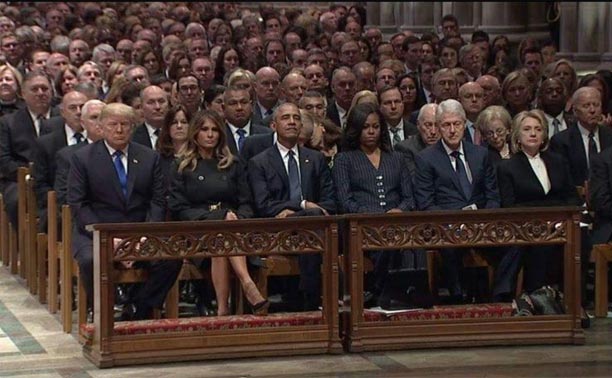| « Our Algorithmic Inquisition: How Google, YouTube, Facebook, and Bing Became the Iron Maidens of Speech | The Catholic Church and Its Enduring Role in Promoting Overpopulation in the Global South » |
Some Crucial Features of Contemporary Warfare: War Crimes and Warlordism
Dr. Vladislav B. Sotirović
War Crimes and War Criminals
After WWII, there was a growing number of significant non-state actors in international relations (IR), like the United Nations (UN) or various specialist agencies connected to it. Nevertheless, two key developments stimulated the growth of such organizations after 1945:
- The realization that building cooperation and collective security was a much wider task than merely deterring aggressors in traditional attacks on the fixed international order. It, therefore, involved finding ways of agreeing on international policy in a variety of practice areas.
- The coverage of international law is increasing to include new foci, including human rights, social justice, the natural environment, and war crimes.
The final result of such post-WWII development in IR and global politics was that the application of the UN’s system took place within the context of the growth and expansion of international law, which also dealt with war crimes. As a consequence, IR became less concerned with the state’s freedoms and independence alone but was becoming more interested in general welfare concerning including those affecting various non-state actors, such as pressure groups of different kinds, not least those demanding the investigation of war crimes, including ethnic cleansing and the forms of genocide.
However, since the Cold War’s two nuclear Superpowers for geopolitical reasons, often been supporters of anti-democratic regimes that notoriously violated their own citizen’s rights, like the US support of the authoritarian regime of General Pinochet (1973−1990), in Chile than the removal of such structural condition appeared favorable to a general improvement in those countries requiring the investigation of the violation of human rights in some cases of the civil wars connected with war crimes.
The phenomenon of war crimes is commonly understood as individual responsibility for violations of the internationally agreed-upon laws and customs of warfare. The responsibility of such kind is covering both the commission of war crimes in a direct way and the ordering or facilitating of them. In principle, the rule violated must be part of the international customary law or part of an applicable treaty.
Chronologically, the first and unsuccessful attempts at the prosecution of war crimes were after the Great War (1914−1918). In this respect, it has to be clear that the first massive war crimes against the civil population during WWI were committed by the Austro-Hungarian army in West Serbia in August 1914. Nonetheless, the same problem of individual responsibility for war crimes became once again actual during and after WWII, with the declarations in 1942 and 1943 by the Allied coalition. It was, basically, the expression of the determination to prosecute and punish at least major war criminals on the opposite (lost) side, but, unfortunately, not on their own as well (for instance, regarding the 1945 Dresden Massacre). Another practical purpose was to establish the tribunals for such cases to take place in Nüremberg in Germany (for the Nazi German war criminals) and Tokyo in Japan (for Japanese war criminals).
The war crimes committed in WWII had been covering the so-called “crimes against humanity” as defined by the Charter of the International Military Tribunal that was established in Nüremberg, like killing, extermination, enslavement, deportation, and other inhuman acts committed against the civilian population either before or during a war. In addition, the same category of war crimes was put on political, racial, or religious foundations, followed by the crime of aggression and crimes against peace, like planning, preparation, initiation, or waging of a war of aggression.
War crimes are, in general as well as understood in terms of all of those acts that are defined as the so-called “grave breaches” of the 1949 Geneva Conventions and Additional Protocol 1 of 1977. Later, the acts of war crimes are defined in the 1993 Statute of the International Criminal Tribunal for the Former Yugoslavia, by the 1994 Statute of the International Criminal Tribunal for Rwanda, followed by Article 8 of the 1998 Rome Statute of the International Criminal Court. Nevertheless, in the 1990s, it was on agenda a greater willingness by one part of states to establish the so-called “international” courts for the matter of prosecution of potentially committed war crimes with the first such tribunal established after WWII which was dealing with the cases from the territory of ex-Yugoslavia followed by the similar court for Rwanda and successful negotiation of the Rome Statute of the International Criminal Court.
The conflicts which followed the brutal destruction of ex-Yugoslavia (1991−1995) have been widely referred to as the European bloodiest conflicts after 1945, partly because of the severity and intensity of the actual warfare and partly because of mass ethnic cleansings on all sides. However, this war practice from the 1990s became infamous for the war crimes they were alleged to have committed. Nevertheless, the case of the Yugoslav destruction in the 1990s became officially the first military conflict after WWII formally to be judged as genocidal by the Western part of the international community.
Regarding the process of the persecution of war criminals, it was a 1998 international conference in Rome that was imagined to take focal points in both formulating a treaty for signature and ratification a new statute for an International Criminal Court (ICC). The court had to have a global jurisdiction, to be complementary to national courts dealing with the cases of genocide, war crimes, and ethnic cleansing. The ICC was imagined to be a permanent institution, unlike several previous courts for the investigation of war crimes (for Yugoslavia and Rwanda, for instance). However, three states openly announced not to vote for the creation of the ICC–USA, China, and Israel under the claim (at least by the USA) that their soldiers or/and peacekeepers abroad could be easily brought before the ICC but on politically motivated charges, not on real war crimes evidences.
Warlordism
Concerning warlordism – a phenomenon and term directly connected in many practical cases with war crimes, it is, in a broader term, used to mark a condition of the weak central government of the failed states in which a single warlord, or rival warlike militants, each led usually by one dominant military leader. Such leaders are in control of a significant portion of the state’s territory, opposing official governmental forces and, that is most importantly, exerting power within that controlled territory as a private independent state. Nevertheless, in many if not the majority of cases, warlordism is a direct result of a military coup or civil war within a state, which causes a division of that territory between warring parties (for instance, the case of Bosnian Muslim extremist Naser Orić in the town of Srebrenica in 1992−1995).
Historically, warlordism is mostly associated with the Chinese provincial/regional military commanders doing their job during the first half of the 20th century. In 1916 (after the death of Yuan Shikai), the Chinese territory was divided between several regional warlords and rulers. The point was that they all claimed to have military/political power over their territory based on a personal/private army. Originally, those Chinese (and many other) warlords were mostly former soldiers of the official governmental authorities who were at the same time a kind of gangsters, bandits, and even local officials. In principle, all warlords are highly dependent on revenue from the local community (towns and agricultural areas) for the very reason of supporting military troops as best as the task can defend all their local rivalries. The winning warlords (like Pancho Villa in Mexico) were successfully controlling easily defended areas, even the whole provinces of the country. Nonetheless, as a matter of fact, the most bloody wars between rival warlords and governmental authorities required the massive (forceful or voluntary) mobilization of the local inhabitants.
In the majority of the cases, warlords had controlled a certain territory depending on their military power, which had to have a strong (local) logistical support. Such a situation on the ground is enabling the warlords to collect (forcefully) taxis (for “national liberation/independence” or similar) with the control of other (material/natural/human) resources, including, in all cases, food production at the first.
Nonetheless, the practice of warlordism can also occur when the central authority of the state fails, where multiple warlords and their loyal militias or paramilitary parties’ troops fill vacuums of power through violence and fear (for instance, Taliban units in Afghanistan from 2001 to 2021). Although warlordism is a prominent historical feature, like in ancient China or Medieval Europe, recent instances of warlordism still exist in several countries in Africa, Asia, or South American Colombia.
-###-
| Dr. Vladislav B. Sotirović Ex-University Professor Vilnius, Lithuania Research Fellow at the Center for Geostrategic Studies Belgrade, Serbia www.geostrategy.rs sotirovic1967@gmail.com © Vladislav B. Sotirović 2025 |
 |
Personal disclaimer:
The author writes for this publication in a private capacity, which is unrepresentative of anyone or any organization except for his own personal views. Nothing written by the author should ever be conflated with the editorial views or official positions of any other media outlet or institution.
Some Crucial Features of Contemporary Warfare: War Crimes and Warlordism
https://www.thepeoplesvoice.org/TPV3/Voices.php/2025/05/12/some-crucial-features-of-contemporary




